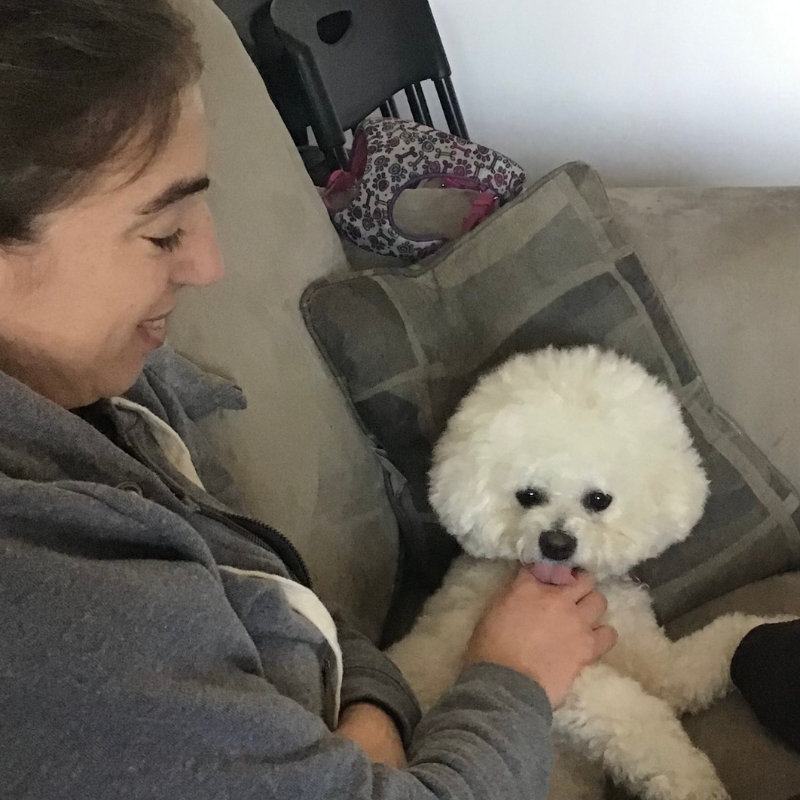My emotional support dog, Gabi, is a cute, fluffy, white bichon frise. She comes with me everywhere — to shul, to work, to the doctor — and sits calmly next to me, or rides in my little blue backpack. Having an emotional support animal requires tremendous vulnerability: Gabi is a public reminder that I am a work-in-progress. And yet, she is essential to my journey of healing. Through loving Gabi and practicing compassion, I am learning to be compassionate with myself. For me, practicing is the process of becoming.
I think about Gabi when I read about Bilam and his donkey in this week’s Torah portion. Balak, the king of Moav, has asked Bilam to curse the children of Israel. Bilam sets off, but his donkey doesn’t cooperate. Taking out his frustrations — and most likely his ambivalence about his mission — on his donkey, Bilam hits the animal repeatedly. Remarkably, the donkey speaks back to him. A famous mishnah (Pirkei Avot 5:6) states that this special animal was created at the world’s beginning. In reminding Bilam that she is his faithful donkey, she reminds him of her place — and his place — in creation. God has “uncovered” Bilam’s eyes (Numbers 22:31), and with the spiritual-emotional support of his donkey, he continues on his journey.
Find more commentaries on Balak.
Many midrashim and commentators understand Bilam to be so ill-intentioned that he is not capable of growth: God has to put words in his mouth for all three blessings. But I am drawn to the Ramban’s detailed analysis of the text, which suggests change and evolution. Bilam’s second blessing had included the line, “There is no augury in Jacob, no divining in Israel” (Numbers 23:23). Bilam genuinely takes this in, the Ramban says, which is why we read several verses later that when preparing for his third prophecy, Bilam does not go “in search of omens” (Numbers 24:1). Rather, “the spirit of God came upon him” (Numbers 24:2). This language of “the spirit of God,” the Ramban argues, is the same as is used with other prophets. When Bilam himself speaks the phrase “eyes uncovered” in his third blessing (Numbers 24:4), it reminds us of the incident with the donkey and, as I read it, is a testament to his continued growth. In other words, Bilam has to practice speaking the truth; it is through speaking the word of God that he becomes a prophet.
Indeed, the biblical text reads “Bilam saw that it was good in God’s eyes to bless Israel” (Numbers 24:1). The Hebrew phrase is ki tov — the same refrain that is repeated seven times in the story of creation. It’s as if, by Bilam’s third prophecy, he has begun to see connections to all living things: to his donkey, to the children of Israel — whom he now turns toward as he begins to speak — and, of course, to the Divine. Avivah Zornberg notes that it is only with the third prophecy that Bilam is able to switch from third to second person: how good are your tents, O Jacob (“Bewilderments,” 261). When Bilam looks out to the wilderness at Israel’s “dwelling places,” and, in particular, the Mishkan, we can imagine a genuine yearning, an envy, for the constant presence of the Shechina.
Find more commentaries on Democracy.
Here in the United States, as we draw nearer to the November elections, we see constant reminders that our democracy is a work-in-progress. We have a fascist demagogue leading in the polls and judicial and legislative institutions that are quickly losing their legitimacy. In the next several months, as the news cycle runs its endless course, we will face obstacles that will make us feel like we need a punching bag. Yet in an era in which truth is assailed from all sides, we must bravely move forward with “eyes uncovered.” By practicing democracy — working to get out the vote, engaging in conversation, writing letters to the editor — we will make democracy a reality. We must choose our areas of service, and through our actions, recreate our Dwelling Spaces as a true mirror of the Divine. For this task, we have been endowed, through Bilam and his donkey, with words of steadfast emotional support. Each morning, when we say ‘ma tovu,’ we turn our gaze out towards the wilderness around us and know that we are connected to each precious, unique creation — a unity that has tremendous power. If Bilam is capable of speaking his truth, so are we.
Yedida Kanfer, PhD, is a rabbinical student at the Academy for Jewish Religion – California and a member of the first cohort of T’ruah’s D’var Torah Fellowship.

